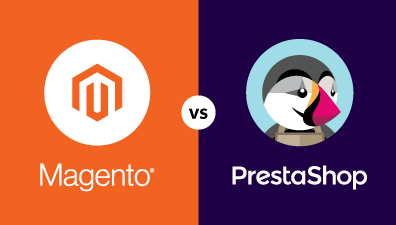Magento is one of the most popular eCommerce platforms for businesses of all sizes. With its robust features and flexibility, Magento allows businesses to create a highly customizable online store that can meet their unique needs. However, with the rise of mobile devices, businesses face a new challenge, providing a seamless, cohesive user experience across any device. This is where Progressive Web Apps (PWA) come into play. In this article, we’ll take a closer look at the comparison between Magento PWA vs Magento website and help you to answer the following questions: which one is better for your business? Does Magento PWA really outstand the regular Magento website?
Table of Contents
Magento PWA vs Magento Website: A User Experience Comparison
First, let’s look closer at the user experience of Magento PWA vs Magento website.
Design
Magento PWA and Magento website design comparison plays a crucial role in differentiating between the two. Magento PWA, being a modern approach to web development, leverages the latest design trends and techniques to offer a seamless user experience across different devices and present your website in a pleasant manner. Its design is optimized for mobile devices, making it more responsive and faster than the traditional Magento website overall.

On the other hand, Magento website design, while being highly customizable, can be complex and require a lot of technical expertise to manage. Its design may not always be optimized for mobile devices, which can result in a poor user experience. The easiest way you can apply to optimize your site and make it mobile-friendly is by exploring various engaging themes from third-party providers. There are several Magento theme providers in the market offering competitive prices.
User Interface And Navigation
A website should have an easy-to-use interface, with clear and intuitive navigation that allows users to find what they’re looking for quickly and easily. This is essential for providing a positive user experience and keeping visitors engaged on the site.
In essence, with its applied technology, Magento PWA coherently provides a more user-friendly interface than traditional Magento websites, which can help increase engagement and sales. The interface elements are optimized for touch devices and the use of gestures. This allows users to interact with the website seamlessly, making it easy to browse, search, and purchase products.

In contrast, the Magento website has a more traditional website interface that may not be as user-friendly as PWA. While it still offers a great deal of functionality and customizability, its interface may not be as intuitive for users who are used to the ease of navigation and sleek design offered by PWA. To ensure your website’s user-friendly ability, you may need a professional, creative UX/UI designer to draft a design that fits your requirements, and an appropriate experienced Magento developer (even a whole team) to make that design come to life.
Mobile-friendliness And Responsiveness
Having a website that is responsive and adaptable to different screen sizes is crucial in today’s digital world. With an increasing number of people accessing the internet through different devices, it’s essential to provide a consistent and seamless user experience across all platforms.
Magento PWA is highly responsive and adaptable, making it perfect for any screen type such as desktop, mobile, and tablet. Its design ensures that the website functions well and looks great on any device, providing a consistent and enjoyable user experience. This is especially important for eCommerce websites, where customers expect a smooth and hassle-free online shopping experience.

In contrast, the Magento website may not be as responsive and adaptable as Magento PWA. It may require additional customization to ensure that it works well on all devices, which can be time-consuming and costly. This can result in a less optimal user experience, which may ultimately affect the success of the website.
Speed
Speed is a critical factor that can impact the success of an online store. Fortunately, Magento PWA is designed to be fast and efficient, with optimized code and minimal server requests. This makes it ideal for businesses that have a large SKU and looking to provide a speedy and seamless user experience. The app-like interface and minimalistic design also contribute to the website’s fast loading times.

Meanwhile, the Magento website may require additional optimization to improve its speed and performance. This can include optimizing images, compressing files, and reducing server requests. While these optimizations can improve the website’s speed, they may require additional technical knowledge and resources to implement.
Offline Capability
Unlike the traditional Magento website which relies entirely on the Internet connection and cannot function offline, PWA can provide offline capabilities, allowing customers to browse products, add items to their cart, and even complete transactions without an Internet connection. This is made possible by using service workers, which store relevant data in the browser’s cache and enable offline access to the website.
With offline capabilities, Magento PWA can provide a seamless and uninterrupted user experience, which is critical for businesses that want to maintain customer engagement and loyalty. Additionally, this feature can help businesses in areas with limited internet connectivity, making it possible to continue selling products and services even when there is no internet access.
App-like Experience
An app-like experience refers to the look and feel of a website that resembles a mobile application. With Magento PWA, users can enjoy an app-like experience with its modern, sleek design that is optimized for mobile devices. The PWA technology allows for a seamless, fast, and interactive user experience, which is similar to what you would expect from a native mobile app. This means that customers can enjoy a shopping experience that feels more engaging and immersive, leading to higher customer satisfaction and more sales.

On the other hand, the Magento website may not provide the same level of app-like experience as PWA, as it has a more traditional website interface.
Other Features
Magento websites offer a wide range of remarkable features:
- Multi-language support
- Multi-currency support
- Customizable checkout
- Third-party extensions integration
- Catalog Browsing
- Product Browsing
- Customer accounts
- Order management
- Marketing tools
In addition to these features above, a website integrated with Magento PWA technology comes with:
- Offline capability
- Push notifications
- App-like experience
- Lightning-fast loading speed
- Add-to-Home-screen capability
Magento PWA vs Magento Website: A Technical Comparison
Magento PWA vs Magento Website are two different approaches to building an eCommerce website using Magento technology.
Installation
Installing Magento Open Source is a straightforward process with PHP and MySQL support, as well as a compatible operating system. After confirming that your system meets the Magento 2 requirements, you can download and install the latest version. To customize the appearance of your Magento website, you can install a Magento theme. Choosing a theme that aligns with your brand identity is simple and time-efficient.
Although installing and configuring Magento Open Source is considered straightforward, it’s important to note that it still requires some technical expertise and is not as easy as eating candy. Compared to other Magento versions such as Magento Enterprise or Magento PWA, it may be simpler, but it is still more complex than setting up a Shopify store or integrating WooCommerce with an existing WordPress website.

On the other hand, Magento PWA development requires a more complex installation process. If you want to integrate a PWA extension with your Magento site, you need to create a separate API. This step establishes a connection between the PWA storefront and the extension in the backend. You need to install and configure the PWA Studio toolset, set up a GraphQL endpoint, and integrate it with the Magento backend. This requires a good understanding of web development and can be very time-consuming. Alternatively, you can opt for a PWA solution provider that offers PWA development services with Magento.
Technology Stack
Magento is built on PHP, which is one of the most widely used programming languages for web development, and various frameworks like Zend Framework 1, Zend Framework 2, and Symfony. It uses MySQL as a database management system and follows the Model-View-Controller (MVC) architecture. Magento 2, the latest version of the Magento platform, uses modern technologies such as HTML5, CSS3, and RequireJS to enhance performance and security.
Magento PWA uses modern web technologies such as React, Redux, and GraphQL to build the front end of the website. The PWA storefront communicates with the Magento 2 API to get the data required for rendering pages. The PWA uses Service Workers to enable offline functionality, and the App Shell architecture to provide an app-like experience.
Functionality
Magento websites offer easy navigation for customers to browse through various products and services. Users can access the store and interact with the page with ease. Features like color filters, price filtering, adding products to a wishlist, and multi-language support are also available. In general, this combination provides a convenient experience for online shoppers.
With Magento PWA, in addition to the standard functionalities of Magento, there are various engaging features available. Some agencies offer many rich attributes such as one-step checkout, improved layered navigation, shop by brand, banner manager, product labels, and live chat.

In this aspect, Magento PWA has more diverse functions compared to Magento websites. Therefore, it can fulfill customers’ expectations for a smoother and more engaging performance.
Progressive Enhancement
Progressive Enhancement is a web development approach that aims to ensure a website’s core functionality works for all users, regardless of their device or internet connection. With this criteria, Magento PWA takes it a step further than the regular Magento website by enabling a better user experience on all devices, regardless of the user’s connection speed or device capability.
Magento PWA uses technologies such as Service Workers and App Shell to allow the website to load instantly, even on slow or unreliable connections. It also ensures that users can still access core functionality even when offline, creating a seamless and consistent user experience.

On the other hand, Magento websites can still provide a good user experience, but it may not be as consistent across different devices and network conditions as PWA. The website may have slower load times and limited offline capabilities, which can affect user engagement and conversion rates.
Development Time And Cost
The development time and cost of a Magento website vary depending on the project’s complexity, customization needs, and the development team’s expertise. However, building a Magento website usually takes longer and costs more than building a simple website due to its robust features and functionalities. Setting up Magento Open Source often takes about 2 weeks, including configuring extensions.

Developing a Magento PWA requires more time and investment than building a traditional Magento website. It can take several weeks to months, depending on the solution you choose. Using Magento PWA extensions is less time-consuming, but limited in terms of features. Ready-made Magento PWA themes offer more features but require communication with the theme developer, which can take a few weeks. Developing a PWA requires specialized knowledge and skills in front-end development, and building a robust back-end API. However, once built, PWAs have lower maintenance costs than traditional websites, which can result in long-term cost savings.
SEO optimization
Magento websites offer various features that can improve SEO, such as meta tags and descriptions, SEO-friendly URLs, and the ability to create XML sitemaps. Magento also allows for the integration of SEO extensions, which can further enhance the website’s search engine visibility. Additionally, ensuring smooth mobile performance is crucial for SEO, but standard Magento sites are not yet optimized for mobile performance.

In contrast, Magento PWA is more effective in optimizing SEO rankings than regular Magento websites. Its advanced technology provides a flawless performance, giving you an advantage in SEO. Furthermore, PWA technology can offer additional SEO benefits such as the ability to leverage push notifications and offline caching, which can help drive user engagement and boost search rankings.
PWA is favorable to Google in terms of SEO, as it uses a mobile-first approach. With the growing number of mobile users in online shopping, PWA can provide significant advantages in mobile-friendly focus.
Security And Scalability
Magento websites are secured with SSL certificates, which encrypt the data exchanged between the website and the user. Magento websites also have features to help prevent brute force attacks, session fixation, and SQL injections.
Security is also an essential aspect of Magento PWA. PWA uses HTTPS protocol to encrypt data and ensure secure communication between the server and the client. PWA also has built-in features such as service workers to prevent offline attacks.
In terms of scalability, a Magento website can handle a vast amount of products and orders without compromising website performance. However, scaling up a Magento website requires more hardware resources, which can lead to increased costs.
Scalability is also a strength of Magento PWA. Since PWA is built with a headless architecture, it can handle high traffic loads without affecting website performance. Additionally, PWA can be scaled up without needing extra hardware resources, leading to cost savings.
What Should You Pick For Your Business then?
When deciding between Magento PWA and Magento Website for your business, it is important to consider your budget, desired features, and priorities.
Magento PWA is a great fit for every company but it works best for your business if:
- Companies that prioritize delivering a fast, responsive, and engaging mobile experience to their customers.
- eCommerce businesses that want to boost their SEO ranking on mobile devices.
- Companies that want to stay competitive by keeping up with the latest technology trends in the eCommerce industry.
- Businesses that want to provide customers with a seamless and intuitive shopping experience, regardless of the device they are using.
- Companies that want to reduce bounce rates and increase conversion rates on their mobile eCommerce site.
- Businesses that want to leverage push notifications to stay in touch with their customers and provide personalized marketing messages.
- Companies that want to ensure their eCommerce site is secure, scalable, and easy to maintain.
And in contrast, if you still feel confused about this new technology, you can utilize the regular Magento website (especially the Magento Open Source version) to expand your online business. It’s a best-fit solution for:
- Small to medium-sized businesses with a limited budget for web development or big corporates that don’t want to invest so much into an eCommerce environment.
- Businesses that do not require advanced features and functionalities for their online store.
- Businesses that have a simple product catalog and do not plan to expand significantly in the near future.
- Businesses that do not need a highly customized or unique design for their website.
- Businesses that do not rely heavily on mobile commerce can afford to have a website that is not fully optimized for mobile devices.
In conclusion,
After examining the differences between Magento PWA vs Magento websites, you may have already made a decision on which one to choose. However, we strongly recommend Magento PWA as it provides all the necessary features for a highly responsive online store.
With our elite Magento 2 PWA development services, you can equip your website with an attractive design and full PWA functions at a reasonable cost. Our Magento PWA solution covers all the features you are looking for in a Magento site with leading PWA technology. Don’t hesitate to contact us now to transform your site with this robust Magento PWA development.











